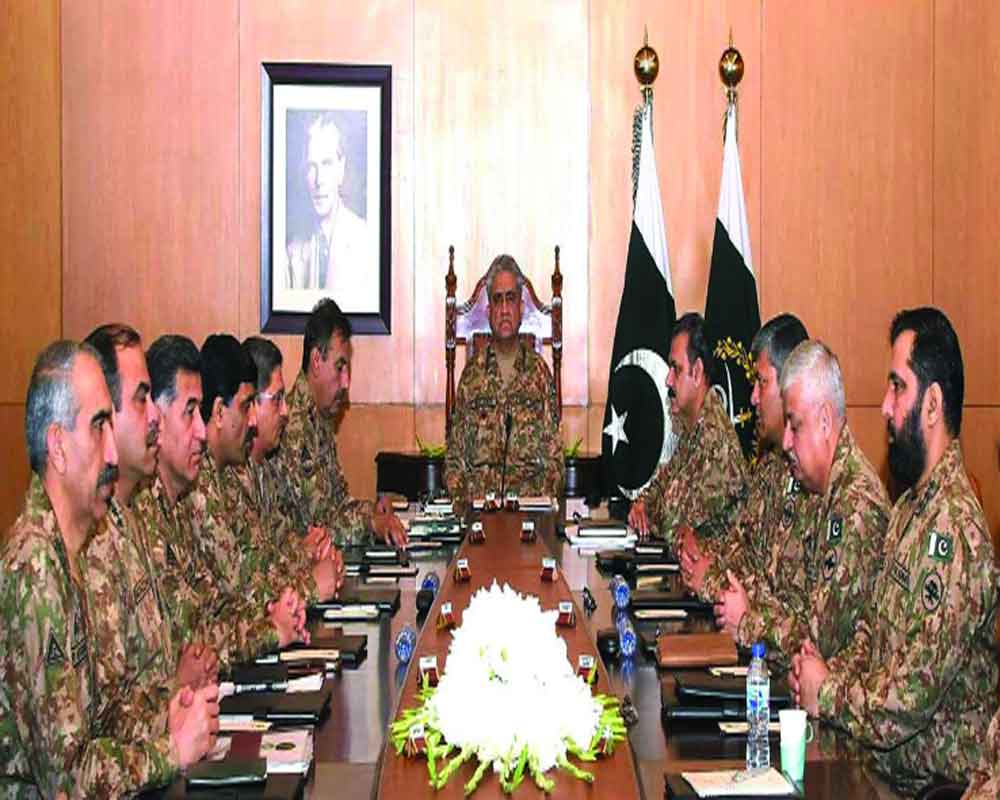These amoral, compromised and dishonourable leaders institutionalised doublespeak and double-dealing that afflicts Pakistan to date
Initially, the Pakistan Army’s motto used to be ‘Ittehad, Yaqeen aur Tanzeem’ (Unity, Faith and Discipline) — insisting on functional attributes that reside in any militaristic framework. The forced takeover by General Zia-ul-Haq in 1977 (ironically called ‘Operation Fair Play’) changed the storyline for posterity. Zia soon initiated systemic sharia-isation of the national narrative, and the Pakistan military was not spared either. Reflecting the deliberate conflation of religion, military and Pakistani identity, the motto of the Pakistani Army was changed to a decidedly religious ‘Imaan, Taqwa, Jihad fi Sabilillah’ (Faith, Piety, Holy War in the path of Allah). This was not harmless semantics but the calculated posturing of the ‘faithful’ in a professional Army to fight the ‘holy war in the path of Allah’. Jinnah’s confused secularism (with underlying two-nation theory) was effectively buried. But just how much personal commitment towards the posited religious tenets would be demonstrated by Pakistani Generals was another matter, beyond the simpler task of changing mottos. Given Pakistan’s foundational weakness in ‘two-nation theory’ that belies the simmering reality of implosive ethnic/sectarian strife (eg, Bangladesh in 1971), the Pakistani military has arrogated a larger-than-constitutionally-mandated role that trumps true democracy.
Pakistani Army has done a far better job of defining and misusing the national narrative to its advantage than it has ever at winning any war. Slogans like ‘Countries have an Army, but Pakistan’s Army has a country’, or calling Pakistani Generals as ‘Crore Commanders’ instead of Corp Commanders, have been doing the rounds for decades. Those fortuitous to head the Pakistan Army (under the mistaken assumption of pliancy by politicians) were usually not the most professionally regarded as Maj Gen Sher Ali Khan, who was denied the top post by Gen Ayub Khan, had later slammed the Gen-turned-President’s professional ability to be “limited to barrack and battalion”. Ayub’s bigoted views towards Bengalis were recorded in his own diary as the urge of East Pakistan “to isolate itself from West Pakistan and revert to Hindu language and culture” as Bengalis in Ayub’s eyes had “no culture and language of their own”. The rot among the Pakistani Generalship also entailed moral turpitude, with Gen Yahya Khan exemplifying the unprofessional excesses. A British High Commission dispatch had documented about him “certainly a colourful character, a near-alcoholic with a marked weakness for the opposite sex”, his debauchery along with his other Generals like Hamid and Peerzada was the worst kept secret. Later, the unbecoming conduct of the ‘Butcher of Bangladesh’, Gen Tikka Khan, and the ultimately dishonoured Gen AK Niazi was the last straw.
To this unhinged fount of institutional privileges birthed the murky ascendancy of Gen Zia-ul-Haq who upped the regression quotient to infuse the ultra-toxic admixture of extreme religiosity, intrigues and deceit. Sir Morrice James had described the institution under Field Marshal Ayub “essentially a Punjab-Pathan autocracy seasoned with emigres from UP” — this undeniable reality had falsely lulled insecure politicians to punt on ‘safe’ Mohajirs as Chiefs of Pakistani Army. Bhutto had fatally superseded six officers to appoint Zia-ul-Haq, and later Nawaz Sharif made the same assumption with Pervez Musharraf. Zia hanged Bhutto, while Musharraf banished Nawaz Sharif to Saudi Arabia. Such was Zia’s cunning that on one occasion he had proclaimed with the Quran in his hand to Bhutto, “You are the saviour of Pakistan, and we owe it to you to be totally loyal to you”; a year later, Zia signed Bhutto’s hanging!
But Gen Zia couldn’t have done what he did by himself; he needed similar-minded conspirators. In Gen Akhtar Abdul Rahman, he saw a journeyman. Like Zia, Akhtar had endeared himself to Bhutto, especially when he was the GOC of 12 Division at Murree, but shifted loyalties later. Even though Akhtar had not participated in Zia’s coup and was known to be opposed to the coup — yet, when contacted by Lt Gen Faiz Ali Chishti to enrol Akhtar’s complicity in a possible countercoup against Zia, Akhtar ingratiated himself to Zia’s camp by informing him about the plan. Later, Zia rewarded Akhtar with the most coveted post of DG of Pakistani spy agency, Inter-Services Intelligence. Soon Akhtar was to supposedly walk the talk of the newly minted motto, ‘Imaan, Taqwa, Jihad fi Sabilillah’, with his shaping of Islamic extremism via Afghan mujahideen, where he was once heard extolling in a presentation, “Kabul must burn! Kabul must burn!” The unholy Operation Cyclone, with ISI-CIA jointsmanship and further funding from Sheikdoms, was Akhtar’s doing. Then these dishonourable Generals also institutionalised double-speak and double-dealing that afflicts Pakistan to date.
Over 33 years after the curious case of ‘exploding mangoes’ that killed both Zia and Akhtar in a mysterious air crash, news of misappropriation of funds for ‘Holy War’ and stashing of the same in private Swiss accounts of Gen Akhtar’s sons surfaced. The reality of ‘Holy War in the path of Allah’, as practised by the amoral and compromised Pakistani military leadership, has tumbled out again. But with Rawalpindi GHQ still controlling all levers, the financially crippled Pakistan Government recently signed a surreal 15 per cent pay increase for its military. The fate of Pakistan, its Generals and outcome of wars is self-explanatory.
(The writer, a military veteran, is a former Lt Governor of Andaman & Nicobar Islands and Puducherry. The views expressed are personal.)


























